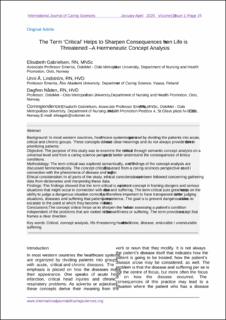| dc.contributor.author | Gabrielsen, Elisabeth | |
| dc.contributor.author | Lindström, Unni Å. | |
| dc.contributor.author | Nåden, Dagfinn | |
| dc.date.accessioned | 2024-02-26T07:46:21Z | |
| dc.date.available | 2024-02-26T07:46:21Z | |
| dc.date.created | 2020-10-14T10:24:33Z | |
| dc.date.issued | 2020 | |
| dc.identifier.citation | International Journal of Caring Sciences (IJCS). 2020, 13 (1), 15-23. | en_US |
| dc.identifier.issn | 1791-5201 | |
| dc.identifier.uri | https://hdl.handle.net/11250/3119779 | |
| dc.description.abstract | Background: In most western countries, healthcare systems are organized by dividing the patients into acute,
critical and chronic groups. These concepts do not have clear meanings and do not always provide direction in
prioritizing patients.
Objective: The purpose of this study was to examine the term critical through semantic concept analysis on a
universal level and from a caring science perspective to better understand the consequences of critical
conditions.
Methodology: The term critical was explored semantically, and the findings of the concept analysis are
discussed hermeneutically. The concept critical is discussed from a caring sciences perspective used in
connection with the phenomena of disease and suffering.
Ethical consideration: In all parts of the study, ethical considerations have been followed concerning gathering
data from dictionaries and interpreting these data.
Findings: The findings showed that the term critical is an important concept in framing dangers and serious
situations that might occur in connection with disease and suffering. The term critical puts great emphasis on the
ability to judge a dangerous situation correctly. It is therefore important to have transparent criteria for judging
situations, diseases and suffering that patients may experience. The goal is to prevent dangerous situations to
escalate to the point at which they become irreversible.
Conclusions: The concept critical helps us to sharpen the focus when assessing a patient’s condition
independent of the problems that are rooted in the disease/illness or suffering. The term provides a concept that
frames a clear direction. | en_US |
| dc.language.iso | eng | en_US |
| dc.relation.uri | http://www.internationaljournalofcaringsciences.org/docs/3_gabrielsenl_original_13_1.pdf | |
| dc.rights | Navngivelse 4.0 Internasjonal | * |
| dc.rights.uri | http://creativecommons.org/licenses/by/4.0/deed.no | * |
| dc.title | The Term 'Critical' Helps to Sharpen Consequences when Life is Threathened - A Hermeneutic Concept Analysis | en_US |
| dc.type | Peer reviewed | en_US |
| dc.type | Journal article | en_US |
| dc.description.version | publishedVersion | en_US |
| cristin.ispublished | true | |
| cristin.fulltext | original | |
| cristin.qualitycode | 0 | |
| dc.identifier.cristin | 1839421 | |
| dc.source.journal | International Journal of Caring Sciences (IJCS) | en_US |
| dc.source.volume | 13 | en_US |
| dc.source.issue | 1 | en_US |
| dc.source.pagenumber | 15-23 | en_US |

